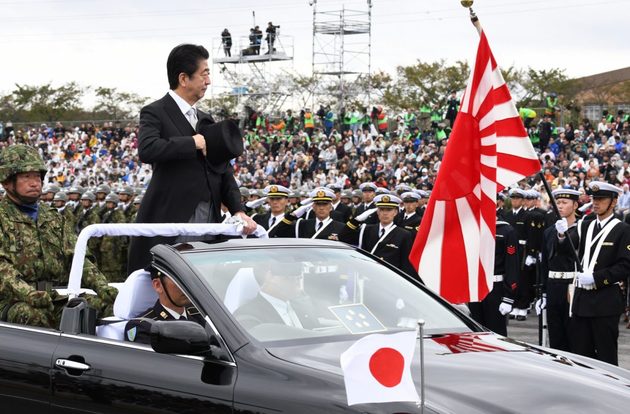After its disastrous defeat in World War II, Tokyo renounced years of warfare in favor of a pacifist outlook, vowing only to use force to protect the Japanese homeland in the event of an attack – never to wage war on an enemy unprovoked. In recent years, however, Japan’s political leaders, especially former prime minister Shinzo Abe, have tried to break the country out of its postwar shell.
Asia Times reports in its article China and Russia wary of Japanese militarism that the rise of China provided a useful alibi for Abe to find ways to bolster his nation’s forces with minimal domestic blowback. He pushed through legislation allowing Japan to defend allies, approved a new muscular defense plan, and was campaigning for amending Japan’s war-renouncing constitution to formalize the resuscitation of the nation’s armed forces, until he stepped down two weeks ago.
Japan can now more effectively defend its mainland and hundreds of islands, fight back if challenged, patrol global sea lanes, and counter adversaries where and when appropriate. This evolutionary shift from militaristic empire to pacifist nation and back to a pro-military political culture gives the US a much stronger ally to fight alongside, but on the other hand it holds the potential to seriously raise regional tensions and the prospects of war with China and Russia.
Russia was the victim of militaristic Germany twice in modern history. And both Russia and China have taken a heavy toll historically at the hands of Japan’s militaristic ideology. In 1904, Japan went to war against Russia by launching a surprise attack. After years of fighting and pseudo-rule, Japan officially annexed the Korean Peninsula in 1910. And in 1932, Japan created a puppet state in China.
It is an undeniable historical fact that Japan was unusually forceful, unrelentingly ambitious, and unsparingly brutal toward China. During the six-week massacre in China now known as the “Rape of Nanking,” Japanese soldiers killed around 300,000 Chinese people and raped upward of 80,000 women.
In the case of both Germany and Japan, there are incipient signs of history repeating. Japan is in many ways a carbon copy of what is unfolding in Germany.
Abe’s agenda on one hand was to jump-start Japan’s sputtering economy, while on the other hand to pursue a muscular foreign policy, with a special focus on countering China. Only a few months into assuming office as prime minister, Abe told The Wall Street Journal in an interview, “I’ve realized that Japan is expected to exert leadership not just on the economic front, but also in the field of security in the Asia-Pacific.”
In December 2018, Abe released a new 10-year defense plan, which among other things called for converting the Izumo helicopter carrier into an aircraft carrier, giving the nation its first vessel of that kind since World War II; spending about US$240 billion on the Self-Defense Forces over the next five years, continuing the nation’s steady increase in defense expenditures; and purchasing new fighter jets to replace old ones.
Clearly, all that equipment was not meant to safeguard the mainland but to add to Japan’s capability of projecting power abroad.
In contrast with Germany, however, Japanese public opinion under Abe became deeply divided and perhaps somewhat ambivalent about his legacy-defining initiative of militarization. Abe’s Liberal Democratic Party shares power with Komeito to stay in charge, and Komeito’s base is largely pacifist. Komeito’s ambivalence turned out to be a major hurdle for Abe’s ambitions to change Japan’s constitution and make the country a regional power with a global vision.
To be fair, Japan also senses it is in danger, surrounded by an imminent threat, North Korea, and a long-term challenger, China. The Japanese military is the most respected institution in Japan and Japanese society isn’t anti-military any more, albeit still anti-war. But the point is, even after Abe’s exit, a leader who desires a more traditional military in Japan will have a propitious political climate to push for change.






